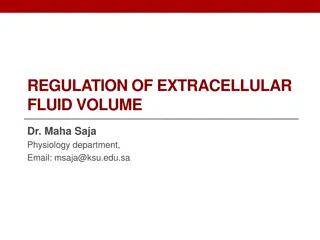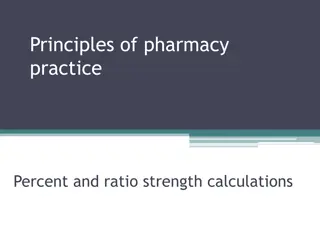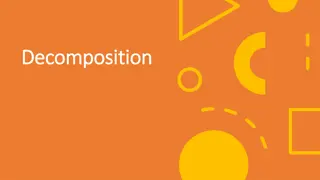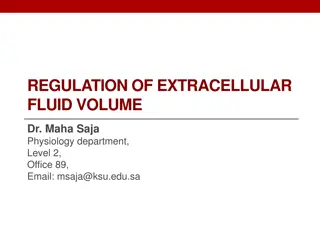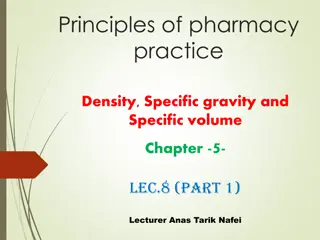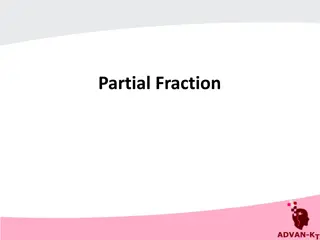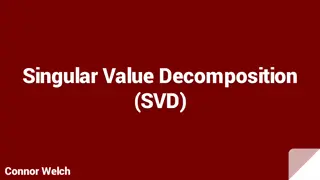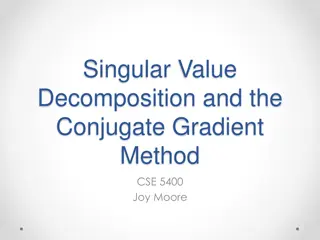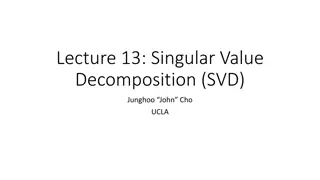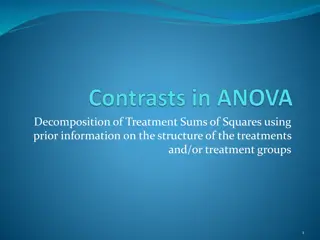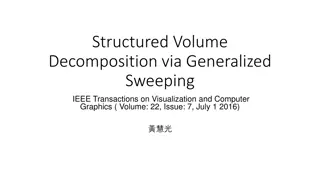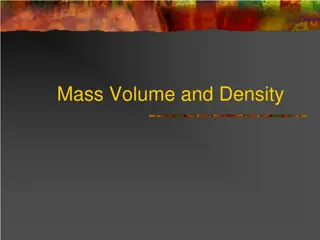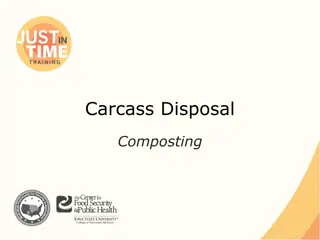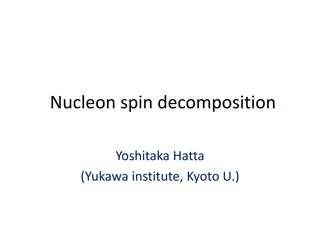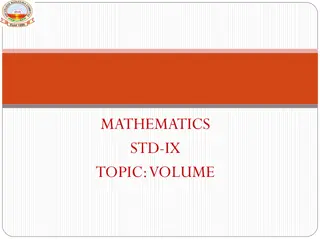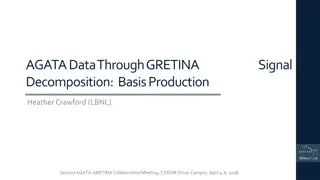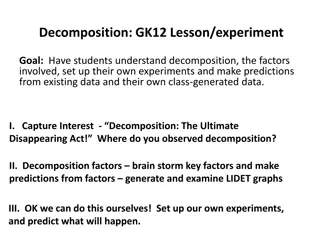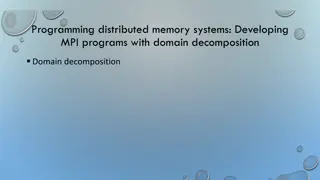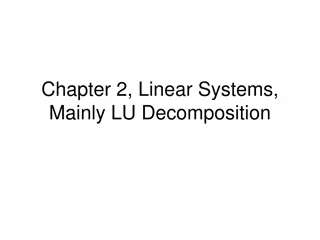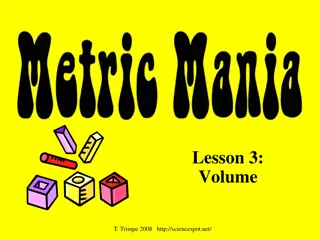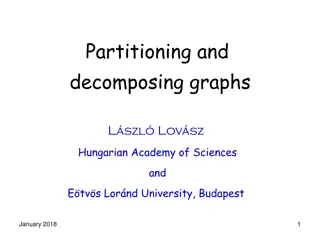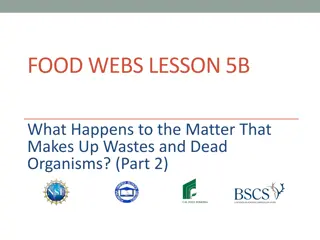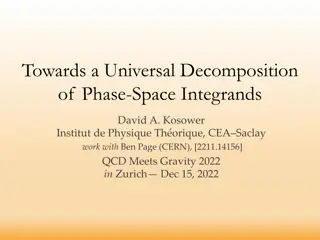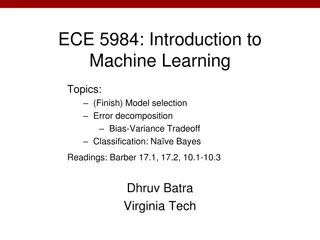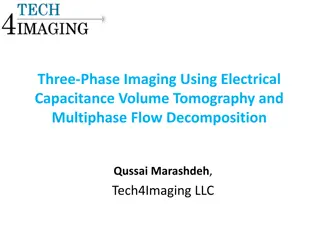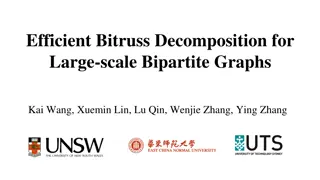Understanding the Fate of Herbicides in Soil
The fate of herbicides in soil is influenced by factors such as micro-organism decomposition, chemical decomposition, photodecomposition, adsorption by soil, surface runoff, leaching, plant uptake, and volatilization. Micro-organisms like algae, fungi, actinomyces, and bacteria play a crucial role i
6 views • 7 slides
Regulation of Extracellular Fluid Volume in Renal Physiology
This lecture focuses on the mechanisms involved in the regulation of extracellular fluid volume, primarily highlighting the role of sensors, effectors, and the kidney in maintaining body fluid balance. It discusses the importance of regulating extracellular fluid volume and osmolarity for controllin
0 views • 25 slides
Pharmacy Practice: Percentage and Ratio Strength Calculations
Understanding percentage and ratio strength calculations is crucial in pharmacy practice. Percentages can be expressed as fractions or decimals, and various concentrations like weight-in-volume and volume-in-volume are used in pharmaceutical preparations. Learn how to calculate the correct strength
0 views • 24 slides
Understanding the Power of Decomposition in Problem Solving
Learn about the concept of decomposition and its importance in problem-solving scenarios in both real-life and Computer Science. Discover how breaking down complex problems into manageable sub-problems can lead to efficient solutions. Explore how decomposition aligns with algorithmic thinking and en
1 views • 11 slides
Regulation of Extracellular Fluid Volume: A Comprehensive Overview
Understanding the intricate mechanisms involved in the regulation of extracellular fluid volume is essential for maintaining normal body function. This includes sensor and effector roles in renal regulation, the influence of aldosterone on Na+ reabsorption, the significance of Na+ balance, and the i
1 views • 22 slides
Understanding Density and Specific Gravity in Pharmacy Practice
Density and specific gravity are important concepts in pharmacy practice for measuring mass and volume relationships of substances. Density is the mass per unit volume of a substance, usually expressed in grams per cubic centimeter, while specific gravity is the ratio of the weight of a substance to
0 views • 21 slides
Parallel Implementation of Multivariate Empirical Mode Decomposition on GPU
Empirical Mode Decomposition (EMD) is a signal processing technique used for separating different oscillation modes in a time series signal. This paper explores the parallel implementation of Multivariate Empirical Mode Decomposition (MEMD) on GPU, discussing numerical steps, implementation details,
1 views • 15 slides
Understanding Gas Laws: Boyle's, Charles', Gay-Lussac's, and Avogadro's Laws
Gas laws such as Boyle's Law, Charles' Law, Gay-Lussac's Law, and Avogadro's Law govern the behavior of gases under different conditions. Boyle's Law relates pressure and volume at constant temperature, Charles' Law relates volume and temperature at constant pressure, Gay-Lussac's Law relates pressu
1 views • 19 slides
Understanding Partial Fraction Decomposition
The partial fraction decomposition method is a powerful technique used to simplify rational functions by breaking them into simpler fractions. It involves reducing the degree of either the numerator or the denominator. Learn about proper and improper fractions, simple and repeated factors, and how t
0 views • 17 slides
Understanding Packed Cell Volume (PCV) and Haematocrit (HCT) Testing
Packed Cell Volume (PCV) or Haematocrit (HCT) is a blood test that measures the volume of red blood cells as a percentage of total blood volume. High or low values can indicate specific health conditions like dehydration or anemia. The test is important in diagnosing conditions like polycythemia. Me
0 views • 14 slides
Understanding Singular Value Decomposition (SVD)
Singular Value Decomposition (SVD) is a powerful method for solving systems of linear equations or matrices that are singular or close to singular. When LU-decomposition or Gaussian elimination fail, SVD provides a stable matrix decomposition helpful in various applications. It is particularly usefu
0 views • 17 slides
Understanding the Singular Value Decomposition
The Singular Value Decomposition (SVD) is a powerful factorization method for matrices, extending the concept of eigenvectors and eigenvalues to non-symmetric matrices. This decomposition allows any matrix to be expressed as the product of three matrices: two orthogonal matrices and a diagonal matri
0 views • 35 slides
Computational Thinking, Algorithms & Programming Overview
This unit covers key concepts in computational thinking, including decomposition, abstraction, and algorithmic thinking. Decomposition involves breaking down complex problems, abstraction focuses on identifying essential elements, and algorithmic thinking is about defining clear instructions to solv
1 views • 5 slides
Understanding Singular Value Decomposition and the Conjugate Gradient Method
Singular Value Decomposition (SVD) is a powerful method that decomposes a matrix into orthogonal matrices and diagonal matrices. It helps in understanding the range, rank, nullity, and goal of matrix transformations. The method involves decomposing a matrix into basis vectors that span its range, id
0 views • 21 slides
Understanding Singular Value Decomposition (SVD) in Linear Algebra
Singular Value Decomposition (SVD) is a powerful technique in linear algebra that breaks down any matrix into orthogonal stretching followed by rotation. It reveals insights into transformations, basis vectors, eigenvalues, and eigenvectors, aiding in understanding linear transformations in a geomet
3 views • 18 slides
Understanding Decomposition of Treatment Sums of Squares
Decomposition of treatment sums of squares involves utilizing prior information about treatment structure to analyze treatment group means through contrasts and hypothesis testing. This process allows for the testing of specific hypotheses and the creation of F-statistics. In an example scenario wit
4 views • 12 slides
Structured Volume Decomposition via Generalized Sweeping
This paper introduces a new technique for generating a simple and predictable structured hex-mesh, providing better convergence properties and more space efficiency in computer graphics and engineering applications. The method involves computing 3D harmonic function decomposition, slicing the object
0 views • 30 slides
Java Review & Functional Decomposition in CSE 122 Spring 2023
Lecture 01 in CSE 122 covers Java review, functional decomposition, and code quality. Announcements include a Java review session, programming assignments, and reminders on Java syntax. The session encourages active participation through in-class activities using Slido polls. Students are also urged
0 views • 24 slides
OpenStack Cinder Storage Capabilities Overview
OpenStack Cinder provides persistent block storage resources for cloud environments with support for multiple back-ends and over 100 volume drivers. This overview covers key features like volume migration, volume retype, generic volume cache, replication, volume groups, backup, and restore. Addition
1 views • 29 slides
Understanding Mass, Volume, and Density in Physics
Matter, which makes up the universe, has mass and volume. Learn the differences between mass and volume, and weight, as well as how to measure them accurately. Discover why a ton of bricks and a ton of feathers have the same mass but different volume. Understanding the concepts of mass, volume, and
3 views • 12 slides
Bi-Decomposition of Large Boolean Functions Using Blocking Edge Graphs
Bi-decomposition is a vital technique in logic synthesis for restructuring Boolean networks. This paper discusses the methodology of breaking down large Boolean functions using Blocking Edge Graphs (BEG) to simplify physical design and reduce complexity. The process involves constructing BEG, perfor
1 views • 29 slides
Effective Carcass Disposal Through Composting
Composting carcasses with organic materials can accelerate biological decomposition, destroy pathogens, and produce a nutrient-rich humus. Proper carbon-to-nitrogen ratios, moisture levels, oxygen maintenance, and temperature control are crucial for the efficiency of the composting process. Mixing a
0 views • 21 slides
Understanding Nucleon Spin Decomposition and Proton Spin Problem
Explore the complex realm of nucleon spin decomposition and the enigmatic proton spin problem, delving into concepts like orbital angular momentum, quarks and gluons' helicity, and longitudinal double spin asymmetry in polarized deep inelastic scattering. Learn about the spin crisis, gluon polarizat
0 views • 26 slides
Understanding Volume in Mathematics: A Comprehensive Guide for Students
This comprehensive guide delves into the topic of volume in mathematics for students. It covers the importance of volume in daily life, how to find the volume of various solid objects using formulas, solving volume-related problems, and applying volume concepts in real-life scenarios. The guide also
0 views • 35 slides
Basis Production Procedure for AGATA through GRETINA Signal Decomposition
This presentation outlines the detailed procedure for generating basis signals in the context of AGATA data processed through GRETINA signal decomposition. It covers the generation of pristine basis signals, superpulse analysis, and the creation of cross-talk corrected basis files. The process invol
0 views • 19 slides
Understanding Decomposition: Experiments & Predictions for Students
Engage students in understanding decomposition through hands-on experiments, predictions based on factors, and analysis of data. Explore various decomposition examples, set up experiments with different variables, and analyze outcomes to enhance comprehension. Utilize resources like LIDET graphs and
0 views • 10 slides
Developing MPI Programs with Domain Decomposition
Domain decomposition is a parallelization method used for developing MPI programs by partitioning the domain into portions and assigning them to different processes. Three common ways of partitioning are block, cyclic, and block-cyclic, each with its own communication requirements. Considerations fo
0 views • 19 slides
Understanding Linear Systems and LU Decomposition
Explore the fundamental concepts of linear algebra, including matrix notation, existence of solutions, vector spaces, computation tasks, and LU decomposition techniques. Learn about Gauss elimination, Crout's algorithm, and how to solve linear systems efficiently using LU decomposition.
0 views • 25 slides
Understanding Volume Measurement in Metric Units
Explore the concept of volume measurement in metric units through lessons on English vs. metric units, measuring liquid volume with graduated cylinders, and calculating solid volume using formulas. Understand the relationship between liters, milliliters, and other units, and learn practical techniqu
0 views • 6 slides
Procedural Decomposition and Static Methods in Programming
Understanding procedural decomposition and static methods is essential in programming to reduce redundancy, organize code effectively, and manage complexity. Procedural decomposition involves dividing a problem into methods, while static methods help in code reuse and managing complexity. By designi
0 views • 18 slides
Enhancing Wind Turbine Performance Through PCWG Activities
The PCWG (Performance Characterization Working Group) aims to improve real-world wind turbine performance prediction beyond the simple Power=P(v) equation. By introducing concepts like Inner-Outer Range Decomposition and Average-Specific Decomposition, the group addresses factors such as environment
0 views • 13 slides
Graph Partitioning and Decomposition Techniques
Explore various graph partition problems and decomposition methods such as regularity partitions, representative sets, and 2-neighborhood representations. Learn about techniques to aggregate, scale down, sample, and divide graphs for efficient analysis and computation. Discover how nodes can be repr
0 views • 45 slides
Understanding Density and Volume in Science Class
Explore the concept of density and volume in science class through hands-on activities and tests. Learn how to calculate density, mass, and volume, and understand the relationship between volume and mass in solving for density. Practice measuring volume and mass with diverse problems to enhance your
0 views • 35 slides
Understanding Decomposition in Food Webs Lesson 5B
Explore the process of decomposition in food webs through a series of investigations involving strawberries and their decomposition process. Uncover the role of mold in decomposition, the consistency of mass despite shrinkage, and the recycling of matter in ecosystems. Engage with questions on the d
0 views • 9 slides
Understanding the Unit of Security in Information Systems
Exploring the concept of the unit of security in information systems, this talk delves into formal perspectives, software security assessments, and the re-identification risk of pseudonymised data. It clarifies that the unit of functional composition differs from the unit of security, emphasizing th
0 views • 29 slides
Advancing Phase-Space Integrands Decomposition in Particle Physics
Towards a universal approach for disentangling complex phase-space integrands in particle collisions, researchers are exploring methods to tame jet hair, cancel divergences in observables, and develop frameworks for precise calculations at various perturbative orders. The vision includes mastering m
0 views • 19 slides
Introduction to Machine Learning: Model Selection and Error Decomposition
This course covers topics such as model selection, error decomposition, bias-variance tradeoff, and classification using Naive Bayes. Students are required to implement linear regression, Naive Bayes, and logistic regression for homework. Important administrative information about deadlines, mid-ter
0 views • 42 slides
Understanding Relational Database Design Principles
Explore the features of good relational design, including atomic domains and first normal form decomposition. Learn about functional dependency theory, algorithms, and database design processes. Discover the importance of atomicity in domain design and the implications of non-atomic values. Gain ins
1 views • 71 slides
Advanced Imaging Techniques for Three-Phase Flows in Reactor Systems
Gas-liquid-solid reactor systems require advanced measuring techniques to understand complex three-phase flows. Multi-Phase Flow Decomposition using Electrical Capacitance Volume Tomography (ECVT) offers innovative solutions for visualizing and quantifying phase hold-up distributions and dynamic cha
0 views • 17 slides
Efficient Bitruss Decomposition for Large-scale Bipartite Graphs
Bitruss decomposition is a powerful concept in graph theory to identify cohesive subgraphs in bipartite graphs. This paper by Kai Wang, Xuemin Lin, Lu Qin, Wenjie Zhang, and Ying Zhang presents an efficient approach for computing bitruss numbers of edges in large-scale bipartite graphs. The study ex
0 views • 25 slides

